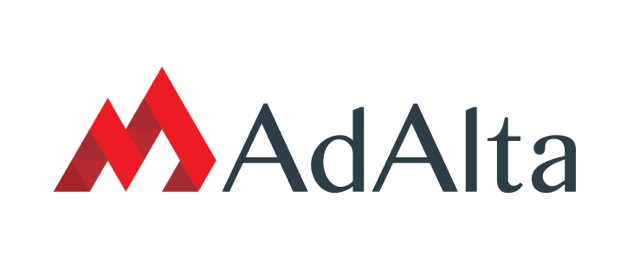31 March 2020

Highlights
• Preparation continues for the healthy volunteer component of AD-214 Phase I study due to start in mid-2020
• GE Healthcare (GEHC) collaboration progresses to next stage; COVID-19 mitigation actions in place
• Development of radio-labelled AD-214 for PET imaging delayed due to COVID-19 but impact mitigated
• AdAlta funded to achieve forecast AD-214 milestones under a range of operating scenarios
• Coronavirus-pulmonary fibrosis link reinforces importance of developing AD-214
AdAlta Limited (ASX: 1AD), the biotechnology company whose i-body platform enables the development of next-generation therapeutics to treat challenging diseases such as Idiopathic Pulmonary Fibrosis (IPF), provides an operational update in response to the current COVID-19 operating environment.
With prudent cash management actions in place and the deferral of the initiation of the strategic growth initiatives which were announced on 3 March, AdAlta is confident that existing cash resources are sufficient to achieve its forecast AD-214 milestones, including under scenarios where key programs are delayed by the external operating environment by at least three months.
The Company has also received several questions relating to opportunities and risks arising from the COVID-19 pandemic and provides a response to these in this update.
Commencement of AD-214 Phase I healthy volunteer clinical study in mid-2020 remains feasible
AdAlta is aware of reports of substantial delays or cancellation of clinical trials around the world. New guidelines for adapting clinical trials to the current operating environment are being implemented which are designed to preserve clinical resources and protect patients and clinicians. The environment remains highly fluid.
The first part of the Company’s Phase I clinical program for AD-214 will be conducted in healthy volunteers in a dedicated clinical trial unit. AdAlta’s clinical trial partners report that operating impacts from COVID-19 may be less severe in Phase I units and healthy volunteer studies, and that commencement of the Company’s Phase I program in mid2020 remains feasible. AdAlta and our partners (with teams working remotely) are continuing to prepare the Phase I program for commencement of the healthy volunteer part in accordance with the Company’s previously announced mid-2020 timeline.
AdAlta’s risk and scenario analysis (see contingent operating plans section below) includes a delay in commencement of the Phase I clinical trial of at least three-months, which would approximately align with various projections for the time course of severe COVID-19 disruption.
GEHC collaboration progresses to Stage 3, adapted for operating environment
AdAlta and GEHC have confirmed that their collaboration to discover i-body candidates as diagnostic imaging agents will proceed to Stage 3. AdAlta has to date received an initial milestone payment and research fees for Stage 1 and Stage 2 of the collaboration which are substantially complete. The research fee for Stage 3 will be paid in instalments. The phasing of these instalments will be adjusted in the event that reduced laboratory operations or laboratory closure in response to COVID-19 impact the duration of Stage 3.
Development of radio-labelled AD-214 for PET imaging delayed
In December 2019, AdAlta announced the award of a A$1 million Medical Research Future Fund (MRFF) Biomedical Translation Bridge (BTB) Grant to develop a radio-labelled version of AD-214 for PET imaging in clinical trials.
Preliminary results have shown that chelation agents that will bind the radioisotope can be added to AD-214. The laboratory of AdAlta’s chelation chemistry collaborator has now been closed and the laboratory of the collaborator producing the radioisotope is substantially reducing operations, both in response to COVID-19.
While these closures will delay the development of the PET tracer, and potentially its introduction to the patient part of the Phase I program, by at least three months, the fourto-five-month initial healthy volunteer component of the trial does not rely upon the PET tracer being available.
All the costs associated with the PET tracer development are external to AdAlta and so this delay represents a deferral of expenditure and does not negatively impact cash reserves. The Company has been advised that the BTB Grant Funding Agreement is able to accommodate at least six months of delays and the total value of grant funds will not be affected.
Read the full media release here.



